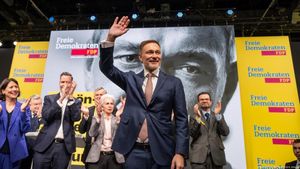The recent state elections in Germany have marked a significant shift in the political dynamics of the nation, with the conservative CDU/CSU alliance, led by Friedrich Merz, achieving between 28.5 and 29 percent of the vote according to initial TV exit polls. Notably, the far-right party Alternative for Germany (AfD) surged to prominence, securing around 19.5 to 20 percent, effectively doubling its performance from the last election held in 2021.
This remarkable rise of the AfD has been attributed to mounting public fears concerning immigration and security, particularly following several high-profile attacks linked to migrants, alongside growing economic anxieties. Despite this strong showing, the AfD is poised to remain outside of power for the time being, as potential coalition partners express unwillingness to associate with the far-right party.
Friedrich Merz, who appears on track to become the next Chancellor of Germany, faces the difficult task of forging alliances to secure a parliamentary majority. The Coalition partners he may need to reach out to include the Social Democratic Party (SPD) led by outgoing Chancellor Olaf Scholz, which unfortunately for them, recorded what is likely their worst performance ever, garnering between 16 and 16.5 percent.
The results indicate potential partnerships as the Greens—another possible coalition member—are reported to have received between 12 and 13.5 percent. For full clarity on coalition possibilities, the performances of smaller parties, including the far-left Linke, which likely managed to clear the five-percent hurdle with 8.5 to 9 percent of the vote, will also be examined.
Christian Democratic Union’s achievements, alongside the AfD’s unexpected success, reflect changing sentiments within Germany's electorate. Notably, the far-right party’s increase can be linked directly to rising fears surrounding immigration issues and political marginalization, noted by Natascha Strobl—a recognized authority on far-right ideologies—who emphasized these points during her commentary on the elections.
Strobl's insights provide clarity around why voters are now feeling more drawn to the AfD, stating, "The surge of the anti-immigration AfD was fueled by public fears over immigration and security after a spate of deadly attacks blamed on migrants and worries about the ailing economy,” confirming the narrative behind the party's popularity.
At the heart of this election is also the role the SPD must now play. Historically, they have been one of the major parties within Germany, but the current numbers signal deeply troubling times for the party. Their workout being positioned for such unfortunate results speaks volumes about the urgent restructuring needed within their strategy.
On the other side of the aisle, as the SPD grapples with this unexpected defeat, the Greens find themselves with significant leverage. They have previously partnered with the SPD, but with their improving standings, they could dictate terms for coalition talks moving forward.
Germany’s political future is poised for disruption. Beyond party dynamics, the consequences of the AfD’s ascent can't be underestimated, as they continue to challenge the moral compass of Germany's political foundation. The statement from France 24 emphasizes the historic nature of the AfD’s gains, noting, "This outstanding result from the AfD has doubled its score since the last election in 2021," signifying not just changes at the ballot box but also framing social conversations at national platforms.
With CDU now embracing their opportunity, it's apparent their strategies going forward will be inflected with the recent rise of anti-establishment sentiment. How Merz navigates these waters with the full spectrum of potential coalitions remains to be seen; he could find himself either leading Germany toward stability or embroiled yet again with the polarizing nature of the debate surrounding the AfD.
The outcome of these elections serves as more than just political numbers but reflects the growing divisions within the societal fabric of Germany. It calls for urgent conversations about what direction the future of German politics will take amid these ideological splits before the next elections roll around.



